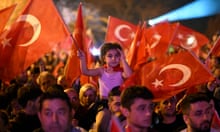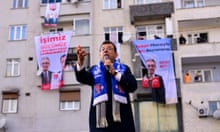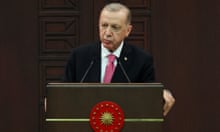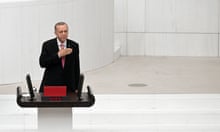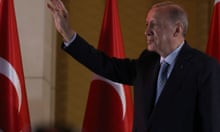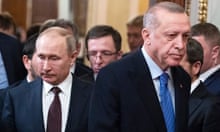Recep Tayyip Erdoğan has extended his two decades in power, securing victory over his rival Kemal Kılıçdaroğlu after an unprecedented presidential runoff election, in a vote that reflected Turkey’s stark and persistent political polarisation.
With 99.43% of the vote counted, Turkey’s supreme election authority announced late on Sunday that Erdoğan had won 52.14% of the votes, while Kılıçdaroğlu received 47.86%. With a gap of more than 2m votes between candidates, the votes yet to be counted would not change the result, said Ahmet Yener, the head of the election board.
Even before the result was called, a triumphant Erdoğan stood on top of a bus near his residence in Istanbul to once again sing a campaign song to his adherents and pronounce victory.
“Look at this scene. It’s magnificent,” he said. “We have completed the second round of the presidential elections with the favour of our nation.”
He added: “Elections come and go, the flood goes away but the sand remains. The main thing is that our country does not deviate from its goals, and our nation takes care to remain united. This is the biggest message of today’s elections.”
Both candidates encouraged their supporters to show up and vote in a run-off election where turnout was high.
The victory for Turkey’s longest-serving leader affords him both another term in office as president, and an endorsement of his populist style of politics after he emerged victorious in an election that challenged his rule.
The Turkish leader has spent two decades reshaping the country in his own image, concentrating power on his office, detaining opponents and instituting increasingly unorthodox economic policies. Despite this, he gained support in many of the areas of Turkey worst hit by the country’s financial troubles, as well as areas levelled in twin deadly earthquakes that killed more than 50,000 people in south-east Turkey.
“We are not the only ones who have won, Turkey has won … our democracy has won,” Erdoğan later told his supporters from the balcony of the presidential palace.
The Turkish president went on to boast of Turkey’s economic independence despite a financial crisis linked to his policies, one sparking a rising cost of living crisis among his citizens.
“We will wait for the last vote to be counted,” said Ömer Çelik, the spokesperson for Erdoğan’s Justice and Development party (AKP), shortly before congratulations for the incumbent president arrived from leaders in Pakistan, Viktor Orbán of Hungary, and the emir of Qatar.
Further congratulations later arrived from the US president, Joe Biden; the Russian president, Vladimir Putin; the British prime minister, Rishi Sunak; the French president, Emmanuel Macron; Brazil’s president, Luiz Inácio Lula da Silva; and even Erdoğan’s former geopolitical rival the president of Egypt, Abdel Fatah al-Sisi.
At the headquarters of his Republican People’s party (CHP) in the Turkish capital, Kılıçdaroğlu attempted to console his supporters, but made no suggestion he could stand down as opposition leader.
“In this election, the will of the people to change an authoritarian government has clearly emerged, despite all the pressures. We have experienced the most unfair election process of recent years,” he said.
“Despite this climate of fear, I would like to thank all the leaders of our alliance and our citizens. The Republican People’s party and the Nation’s Alliance will continue to struggle with all of their members. We will continue to be the pioneer in this struggle, until real democracy comes to our country. My biggest sadness is the trouble waiting for this country.”
Erdoğan entered the second round in the lead, after a first round race where he received 49.5% of the overall vote compared with Kılıçdaroğlu’s 44.5%, while his AKP along with their nationalist coalition partners won a majority in parliament.
The opposition had succeeded in forcing Erdoğan into a run-off vote – an unprecedented event in the presidential system that Erdoğan introduced – but was ultimately unable to clinch the majority of votes needed to secure victory.
after newsletter promotion
“No one should despair over the election results. No one should feel pessimistic, or feel defeated. If you believe in democracy, we should not forget that elections are the most fundamental function of any democracy,” said Meral Akşener, leader of the opposition IYI (Good) party.
Kılıçdaroğlu and his opposition coalition campaigned on the promise of returning Turkey to parliamentary democracy, pledging to reverse many of the changes that have marked Erdoğan’s two decades of rule, including concentrating power around his office and jailing opponents.
In an interview with CNN, Erdoğan laughed off the suggestion he was seeking increasing authoritarian control. “How could someone going into a runoff election, instead of completing the election in the first round, be a dictator? That is the reality,” he said. “What kind of dictator is that?”
After initially promising a more subdued campaign in response to the earthquakes, Erdoğan’s campaign focused on assuring voters that only he is capable of solving problems that include a worsening economic crisis.
“People who were responsible after the earthquake didn’t do their jobs, but our leader did everything for us,” said Meliha Karabök, in the town of Kahramanmaraş, part of a region that encompasses the epicentre of both earthquakes, and where Erdoğan won comfortably despite criticism of his government’s earthquake response.
While the opposition holds mayorships in Turkey’s six largest cities, Kılıçdaroğlu’s campaign appeared to run aground outside his party’s traditional enclaves on the Aegean coast and in metropolitan centres. In the Turkish provinces where Erdoğan’s rule previously catapulted many into the middle class, voters said they were unconvinced by the opposition’s campaign.
“The government cites this idea a lot, that we owe Erdoğan for where Turkey now stands, that Turkey is now a very powerful country and we have done a lot thanks to his leadership, but our country is going through hardship and he should be given enough to time to recover as he’s the only one who can manage this,” said Evren Balta, a political scientist at Özyeğin university.
After a setback for their campaign in the first round vote, Kılıçdaroğlu and the CHP encouraged their supporters to turn out a second time amid heightened concern among the opposition concerning the security of the vote and the count.
CHP officials raised concerns that examples of violence towards their election observers in the south-east city of Şanlıurfa and in Istanbul, where one electoral observer suffered broken ribs, amounted to interference in the voting process.

